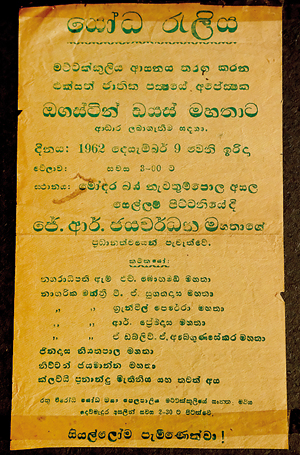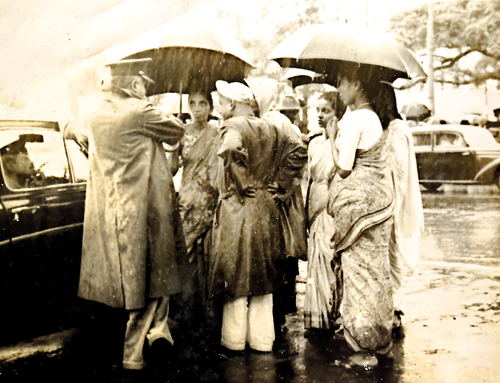Nonagenarian who once strode the UNP platform

Placida with her pets. Pic by Amila Gamage
A faded leaflet gummed onto an old album bulging with black-and-white photographs is announcing a political meeting. The colour is faded but it is obviously green.
Stalwarts are billed to speak at this ‘Yoda Reliya’ on December 9, 1962, with none other than J.R. Jayewardene in the main chair. A Rathu Virodi Yoda Maha Pelapaliya is the precursor to the rally at Mattakkuliya.
Powerful names of a bygone era are listed as speakers………Mayor M.H. Mohamed, V.A. Sugathadasa, Granville Perera, R. Premadasa, A.W.A Abeygunasekera, Jinadasa Niyathapala and Newton Jayamanne.
All in support of the United National Party (UNP) contender, Augustine Dias, contesting the Mattakkuliya ward of the Colombo Municipal Council, which was a stepping stone to Parliament.
A lone female’s name catches the eye – Clive Fernando mathiniya.
On Tuesday, in a home in Mattakkuliya (Colombo 15), we are seated opposite Clive Fernando mathiniya or Placida Fernando aka ‘The Teacher’. She was the ‘Lady Speaker’ on all UNP platforms.
As she looks forward to celebrating her 96th birthday on the 18th of next month (September) life is quieter than it was earlier but still busy.
Life was a swirl of political meetings and protest marches for Placida the young woman, for politics was very much in her blood. How did she join the UNP and pat comes the answer, “My husband was UNP and that was it, so I was UNP.”
“We used to go to Chilaw, address a meeting there, come to Negombo, address another meeting there, go to Colombo, get on the stage near the bridge and then only come home,” she laughs.
Translate she did for “dear old JR” because his Sinhala was not that good at the beginning.
Out of frayed albums are pulled tiny black-and-white photographs, with many a tale. One is how there was a huge protest in the rain, by umbrella-wielding women led by Placida, opposite Temple Trees in which was Prime Minister Sirimavo Bandaranaike. Those were the days sans water cannons and baton charges against women.
The demonstration was in protest against the takeover of assisted Catholic schools in the early 1960s.

Faded leaflet from the past: Announcing the Yoda Reliya of 1962
Fearing that a woman or two may faint for lack of food and she would be at the receiving end of criticism, Mrs. B had quietly ordered the police to offer vadai to the protesters. But the burly and buxom fisherfolk of Negombo were not wont to accept the vadai overtures of the police who in sheer desperation had placed some of the vadai in one woman’s jacket.
There are peals of laughter from Placida as she says how the vadai nestled within the ample bosom of the woman, clearly visible as the jacket was low cut.
The ’70s were turbulent times for Placida’s family, as she had been given a political ultimatum – get off the UNP stage or else…..her husband would lose his job. He was attached to Lake House and by that time this newspaper giant had been taken over by the then SLFP government. But no threats could deter her.
We take a walk into her past after she has told us what her present is – “I supervise the two domestic helps who come every day: The cleaner and the ‘cooker’,” she jokes, explaining in great detail how she didn’t supervise the workers who came to her home earlier but had to suffer the loss of two gold bangles that an earlier worker made off with from the rack in her room.
Placida shares her home, adjoining St. Mary’s Church, with her youngest daughter Pavithri who is teaching speech and drama and her well-trained black Labradors, Ginny (named after a character in Harry Potter books) and Miss Ebony III, called the third as two have gone before her.
Her early childhood is tinged with tragedy, for Placida’s mother had died at childbirth when she was just two years old. Coming under the wing of her aunt (father’s sister)Bridget Fernando, a brilliant mathematician who had become a teacher, it is what guided Placida to follow suit. Her forte, however, was English.
Her other two children, eldest daughter Kusum who is heavily into water governance and middle son, Devsiri dabbling in advertising, visit her often.
Getting back to her routine, Placida says that by the time she oversees the cook, it is nearly noon and time for lunch followed by a nap. Every evening, on Kusum’s advice she sits out in the garden with the dogs.
Throughout the interview, the beloved pets are at her feet and when she asks one to give her the paw and she does, Placida says, “Very good girl”, scratching the forehead of Miss Ebony.
In the evening, “I do a little teaching”, we are told, in the garage which had been turned into a class, once the car was sold. Four students hoping to sit the Ordinary Level come for their English lessons, two on Monday and Wednesday and the other two on Tuesday and Thursday, for an hour each day from 5 to 6 in the evening.
Thereafter, it is dinner, watching TV news and to bed. Lunch is mostly rice and curry but dinner varies from thosai to idli or anything that takes her fancy, for she can have her choice from the restaurant across the road.
A legend in the area, the kunu-karayas know the “teacher-ge ge” as also all passers-by.
Placida recalls how she attended Princess of Wales College, Moratuwa, as her aunt was a teacher there. When her aunt had won a scholarship to pursue mathematics in England, her mother, Placida’s grandmother had refused point blank to let her go as she feared that “neva peralai” (the ship will overturn).
Placida’s father had been a Public Works Department (PWD) engineer instrumental in converting all lighthouses dotting the country’s coastline from being kerosene-run to electricity-operated.
His children, including Placida though were caught in a different dilemma. They were Roman Catholic but attending an Anglican school, and every Sunday, when she and her siblings walked into church, the priest would fix a baleful glare on them and shout from the pulpit: “Yaksha iskoleta yana lamai, onna enava.” (The children attending the devil’s school are coming.)
With the important milestone in a Catholic’s life – receiving the sacrament of First Holy Communion – drawing closer, her father had removed Placida from Princess of Wales, even though it was the No. 2 school in the region, and enrolled her for a short period at Our Lady of Victories Convent, Moratuwa, before moving her to Holy Family Convent, Wennappuwa.
Boarding school it was under the strict eyes of the nuns there and a twinkle lightens up Placida’s eyes as she reminisces and re-enacts how each girl had to carry her mattress on the head to be taken out and placed in the sun during the weekends. “One day, I pushed the mattress out of the window,” she says, bringing down on her head the wrath of the nun-in-charge.
Another prank which put her into the bad books of the nuns was when she, as a 10-year-old, urged her peers to throw bilin fruit at the well-known painter Geoffrey Beling of the ’43 Group fame when he came on a visit to HFC.

The leaders of the protest against the takeover of schools discussing strategy- from Placida’s album
It was as a very young woman of about 18 that Placida began teaching at a convent in Ragama, while brokers kept bringing suitors for her. Later she moved to Good Shepherd Convent, Kotahena imparting not only English but also the skills of physical training (PT) and dance. But before that she had also done a stint as a Lecturer at the Bolawalana Catholic Teacher Training School.
By this time Placida had chosen her life’s partner, Clive, an advertising representative at Lake House, rejecting 35 others in the process.
Now looking back wistfully she tells us that she had two careers. On retiring as a teacher from Good Shepherd Convent in 1965 (and then establishing the first Past Teachers’ Association in the country, becoming a trendsetter for many other schools), Placida had taken on the role of letter-writer at the Norwegian-funded charity Mary’s Friends for another quarter century. This was a sponsorship programme for poverty-stricken children and there was an orphanage in Kotahena for them.
“I would go there and translate into English the letters the children wrote in Sinhala to their sponsors,” she says, adding ruefully that she gave up just last year when e-mails took over.
Even though it has been a long widowhood, as Clive had died many decades ago, sprightly Placida at nearly 96 is very much a part of the pulsating life in her neighbourhood.
Having trained the choir at the next-door church, Sunday worshippers still hear her voice rising above the others in praise.
As her daughters speak in glowing terms how good she is at dancing the baila and singing, we urge her to sing to us, for while Placida was a student of the National Training College, she had come under the influence of musical greats Sunil Santha and Saranagupta Amarasinghe who were teachers there.
Without hesitation and no accompaniment, the notes of ‘I’m a very good Sinhala Mahatha, Moratuwa my upangamaa………Employment eka gahala giya……No more drinking, no more eating……..No more, no more’ flows forth. High notes and low, all the stanzas are sung with gusto and that is the tune that we keep humming as we bid goodbye to her.
That is also the image we will hold dear of an extraordinary nonagenarian!


